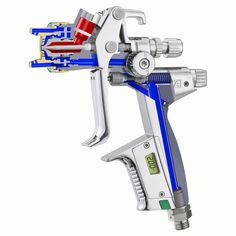The Board sustained two oppositions, finding the term EURO, in the design forms shown below, to be primarily geographically deceptively misdescriptive of paint spray guns made in Taiwan. It also granted a petition to cancel a registration for the standard character mark EURO for the same goods, on the ground of Section 2(a) deceptiveness. SATA GmbH & Co. KG v. Mike Ghorbani, Oppositions Nos. 91210813 and 91217915, Cancellation No. 92059849 (September 8, 2016) [not precedential].

The Board observed that, according to California Innovations, the legal standard for finding a mark primarily geographically deceptively misdescriptive under Section 2(e)(3) is identical to the test for geographical deceptiveness under Section 2(a). [Note: in that case, the CAFC stated that it “anticipates that the PTO will usually address geographically deceptive marks under subsection (e)(3) of amended Lanham Act rather than subsection (a).” So why is the Board dealing with 2(a)? – ed.].
In re Miracle Tuesday sets forth the test under Section 2(e)(3):
[a] mark is primarily geographically deceptively misdescriptive, and thus barred from registration, if: (1) the primary significance of the mark is a generally known geographic location”; (2) “the consuming public is likely to believe the place identified by the mark indicates the origin of the goods bearing the mark, when in fact the goods do not come from that place”; and (3) “the misrepresentation was a material factor in the consumer’s decision” to purchase the goods.
The evidence was clear that the primary significance of the term EURO is Europe. The fact that dictionaries also define EURO as the common currency of participating European countries does not detract from, but rather enhances, this connotation.
There was no dispute that applicant’s goods originate in Taiwan, but would consumers likely believe that they originate in Europe? A goods/place association is established where, as here, the place named is a known source for the goods.
The evidence established that European spray guns, and plaintiff’s spray guns in particular (made in Germany) are highly regarded. Manufacturers and distributors of spray guns compare their products to those of European origin, including plaintiff’s. Thus consumers have been exposed to claims of European superiority or desirability.

As to materiality, the record as a whole established that a substantial portion of U.S. consumers would be influence in their purchasing decisions by the geographic meaning of EURO in applicant’s marks.
The Board therefore ruled in favor of plaintiff in all three proceedings.

